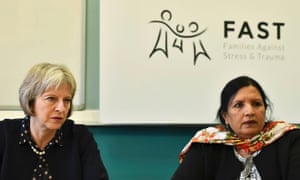
David Cameron and Theresa May’s crackdown on extremism risks undermining the British values ministers want to protect, according to the most senior police chief in charge of anti-radicalisation.
Sir Peter Fahy, chief constable of Greater Manchester police, told the Guardian that the government’s latest plans could be counterproductive, coming at a time when Muslims in the UK feel increasingly alienated.
Fahy, who speaks for the police on the government’s Prevent strategy, said: “There is a concern that efforts to control extremist narratives will limit free speech and backfire if we don’t get the balance right. The efforts to control extremism and limit protest by those caught by too wide a definition may undermine the very rights and British values you seek to protect.”
The chief constable spoke after the home secretary unveiled a string of anti-extremist measures, including a major drive against “entryist” infiltration of the public sector, charities and businesses by Islamist and other extremists as a key part of the government’s counter-extremist strategy.
May also proposed banning orders on non-violent alleged extremists, threats to close mosques, and bars on alleged extremists working with children and vulnerable people.
“We will systematically confront and challenge extremist ideology, exposing it for the lie it is. And we will thwart its destructive consequences. We will disrupt all those who seek to spread hate and we will prosecute all those who break the law,” the home secretary vowed.
The proposals were also condemned by the Muslim Council of Britain. Dr Shuja Shafi, its secretary general, said of the plans: “We cannot help detecting the McCarthyist undertones in the proposal to create blacklists and exclude and ban people deemed to be extremist. If we are to have such lists at all, they should be determined through a transparent process and subject to judicial oversight.”
Fahy said that he was sympathetic to what the government was trying to do, although he had not seen the government’s proposed definition of extremism before publication. He added that he hoped a consultation period and debate could iron out the problems.
Fahy said the way the new measures work could prove problematic. “It draws the police in[to] areas the public will be uncomfortable with if they feel that it erodes free speech or religious freedom or the right to protest. At what point do you erode the British values you are trying to protect. Such as live and let live, and freedom of speech.”
Fahy added that he believed there was a danger that the new plans would turn officers into “thought police … policing religion and not just Muslims”. He added: “The challenge is where you draw the line on that crossing point and that is what the consultation process needs to address.”
 Fahy is difficult for ministers to dismiss as he has previously
supported government plans to extend the Prevent duty to schools and
colleges. His Manchester force runs one of the busiest counter-terrorist
units in the country, and he has long argued it is necessary to run the
Prevent programme as part of an effective counter-terror strategy.
Fahy is difficult for ministers to dismiss as he has previously
supported government plans to extend the Prevent duty to schools and
colleges. His Manchester force runs one of the busiest counter-terrorist
units in the country, and he has long argued it is necessary to run the
Prevent programme as part of an effective counter-terror strategy.He is due to retire from a 34-year career in policing, with his last day as a warranted officer being on Friday. For the last seven years he has been chief constable of GMP, the third biggest force in England and Wales.
The hunt for extremists across the public sector follows the Trojan horse affair in Birmingham schools. The Home Office defines entryism as extremist individuals, groups and organisations consciously seeking to gain positions of influence to better enable them to promote their extremist agenda.
The strategy says: “The review will clearly set out the risk posed and advise on measures to guard against entryism, for example by improving governance, inspection and whistleblowing mechanisms. It will also engage charities and businesses to help them identify and tackle entryist behaviour.”
It will also include an official investigation into the application of sharia law, new powers to intervene in the activities of faith-based “supplementary schools” and a new “extremism community trigger” to guarantee the police will take seriously complaints from the public about suspected extremists.
The inquiry into sharia law will focus on instances where it is applied in a way incompatible with UK law, such as women being pressured to reconcile with violent husbands despite legal injunctions in place to protect them.
The details of the published strategy show that the tough package first proposed by May in March has survived largely intact despite objections from six cabinet colleagues.
Fahy warned the plans come at a time when British Muslims are feeling under pressure on several fronts. “There is a danger that the new laws on extremism alienates non-violent Muslims because of the existing level of mistrust and feeling of stigmatisation. A lot of Muslims feel that there is a constant anti-Muslim narrative in the media.”
He added that there was a risk of ending up with “stereotyping and that population alienated, and end up with a ‘them and us’ narrative”.
The GMP boss is not the only police chief to have told the Guardian of concerns about the new extremism plans. Another senior officer, who asked not to be named, warned they risk damaging an effort of over a decade to isolate those advocating violence from the vast majority in their communities. “I’m not sure [this has] been thought through at all,” the officer said, adding: “The last 10 years we have been trying to drive a wedge between violent extremists and mainstream Muslims.”
Δεν υπάρχουν σχόλια:
Δημοσίευση σχολίου